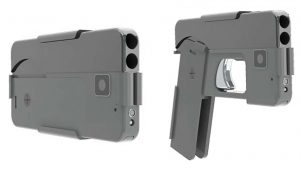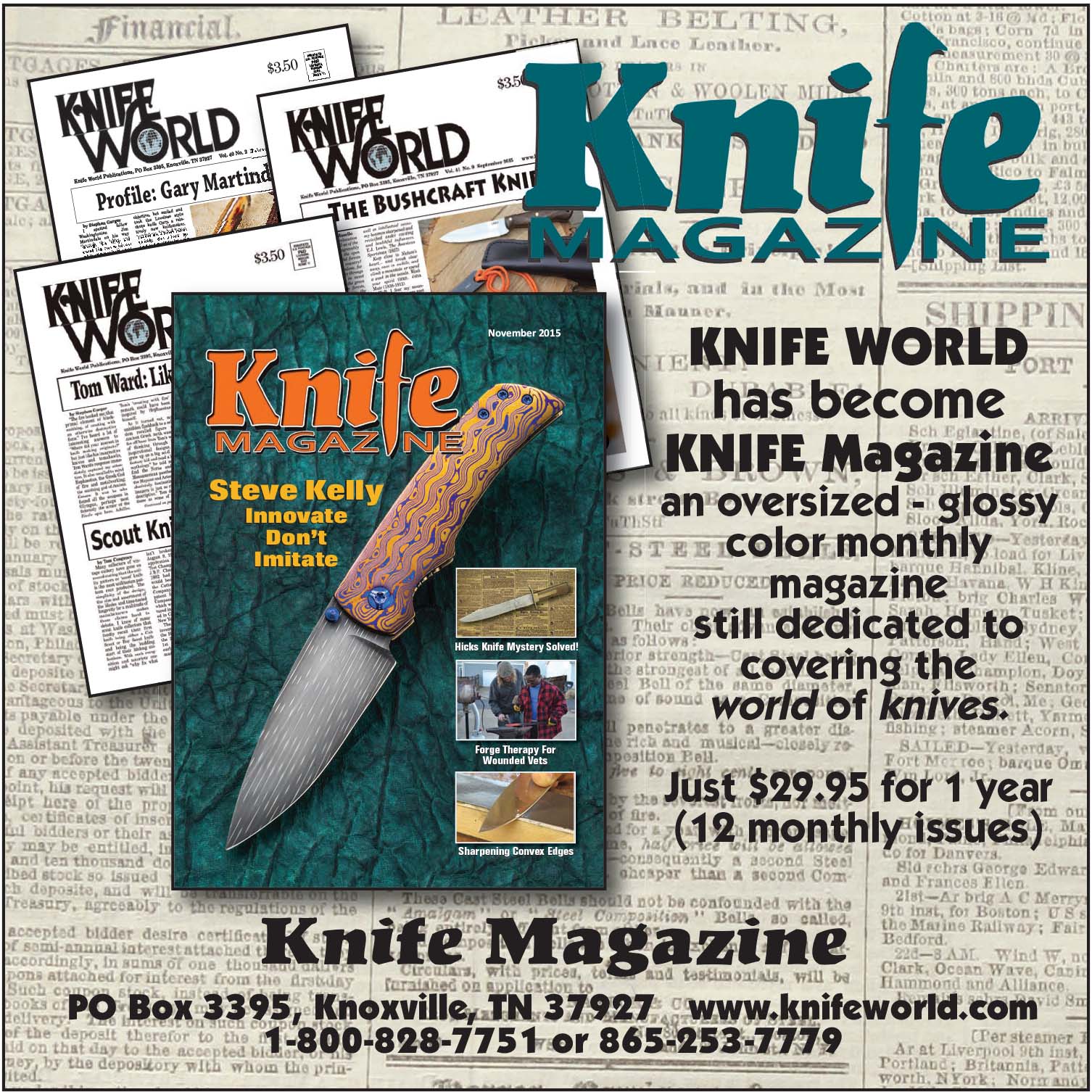by Joseph P. Tartaro | Executive Editor
The Ideal Conceal pistol, aka “the iPhone Gun,” offers a firearms design that’s turning some heads, particularly among devout anti-gunners like Sen. Chuck Schumer (D-NY), and among some pro-gunners as well. Some like the concept and others don’t.
And it’s not even on the market yet!
This novel derringer—which is designed for “concealment” even in open carry—has garnered a lot of attention on the Internet. Some people like the concept, and many who regularly carry larger pistols and revolvers concealed don’t like it.
This last group disdains the .380 ACP cartridge, for which the gun is designed, and others think its two-shot capacity inadequate.
However, there are plenty of people who think it has some application under certain conditions, particularly for certain situations and as a backup.
The gun isn’t even on the market yet, and Schumer is asking the Bureau of Alcohol, Tobacco, Firearms and Explosives (ATF) to restrict sales of the Ideal Conceal by classifying it as a National Firearms Act-regulated “Any Other Weapon (AOW)..”
What’s all the fuss about? Simply this:
The Ideal Conceal is a pistol that folds up into a rectangle about the shape and size of a cell phone, and is made to carry in any pocket safely and very discreetly.
It’s modern-living technology lines belie a relatively simple pistol. It is a modern, two-shot derringer chambered for .380 ACP. The grip portion folds over the trigger guard and trigger, preventing the gun from firing unintentionally when it’s in its cell phone disguise.
The Ideal Conceal is really a “belly gun” so it won’t have conventional sights. Instead, it has a built-in weapon-light and laser pointer for aiming. The simplicity of the design is expected to keep the price low. It is expected when the Ideal Conceal hits the market sometime this fall, it will carry an MSRP of $395.
Schumer, always an advocate for increased gun control, slammed the Ideal Conceal, saying that “this iPhone gun is a disaster waiting to happen” in a statement issued in early April.
“Just like toys that too much look like handguns should not be sold, handguns that look too much like toys should not be sold,” he added.
It appears that Schumer equates the iPhone gun with other AOW items restricted under NFA, such as wallet guns, cane guns, zip guns, pen guns and other items conceived originally by intelligence armorers.
What ATF will decide remains to be seen, but some note that the fact that the Ideal Conceal cannot be shot while concealed in cell phone mode, only when the pistol grip is extended, makes it different from other AOWs. In “gun mode” the Ideal Conceal is hard to mistake as anything other than a pistol, and a sleek, contemporary one at that.
According to the company’s Internet information, the Ideal Conceal is still in its “concept” phase. The company has yet to release photos or a working prototype, or at least it hasn’t appeared to do so. So far, it appears that all images of the cell phone gun have been created with a CAD program and used to promote their idea and website.
According to Ideal Conceal website, the cell phone gun has a variety of features that are touted for both their appearance and safety, including a simple design, a one-piece, lightweight frame, and snag-free hammerless construction.
SEC rules for Cabela’s
One downside element of public ownership of a company’s stock is that anyone can buy shares, even people hostile to all or part of the firm’s business plan. Many publicly traded firms have had to deal with challenges from stockholders on a number of issues from packaging to politics, among them firearms industry firms such as Sturm Ruger and Smith & Wesson and more general retailing operations that also stock and sell guns. Those two examples appear to have resolved proxy issues at recent annual meetings, but one investor keeps trying: The Trinity Church of New York City.
Trinity’s latest target has been Cabela’s, whose shares are traded on the New York Stock Exchange. However, the US Securities and Exchange Commission (SEC) lawyers have determined that Cabela’s will not have to include Trinity’s activist shareholder proposal in its 2016 proxy, according to the National Shooting Sports Foundation.
The Trinity Church wanted to put before Cabela’s shareholders a proposal that would prevent the outdoor specialty retailer from selling firearms capable of holding more than eight rounds of ammunition.
This is a repeat of what happened last year, when a court ruled against a similar shareholder proposal aimed at WalMart.
Such squabbles over politicized proxy fights, particularly about guns and ammunition, however, may probably continue.
Guns and Tourism
Las Vegas is one of America’s premier tourist destinations, especially for adults, many of whom come from countries with very restrictive or prohibitive gun law, like Japan. For many tourists, a short stay in Vegas gives them a chance to satisfy to some extent, their personal interest in firearms, and the city has several commercial ranges which can provide rental access to guns.
Among them is Machine Guns Vegas (MGV) which has now announced that it has added outdoor shooting packages to its indoor range offerings.
MGV’s recently announced that its Las Vegas’ premiere luxury firearms facility started April 1 to allow first-time shooters to advanced firearms enthusiasts to shoot full auto/machine guns on the Strip this Spring.
“If the joy of being in the great outdoors calls to you, wait until you experience it fully-armed… MGV will offer five new premium outdoor packages, with experiences starting at $199,” MGV announced. “Outdoor shooting experiences promise all the thrills of the bevy of exotic firearms used in its luxury indoor facility, but in the vast yet secluded backdrop of the Mojave desert, available exclusively to MGV customers.
What can your entertainment dollars buy? Quite a number of options, from Glock and Beretta pistols to Barrett .50s and other rifles, HK MP5s, grenade launchers, and even canisters of Tannerite, “to light up the sky.”
MGV boasts that its “VIP Gun Lounge” offers “an ultra-discreet experience for celebrities and groups including two completely private firing lanes, a private celebrity waiting lounge with plush furniture, large plasma TVs, iMac, complimentary refreshments and a separate entrance.”
Sneakers and Politics
What do sneakers, or more properly athletic shoes, have to do with federal politics? Apparently plenty when it comes to hot issues being debated on the campaign trails: the Trans-Pacific Partnership (TTP).
New Balance, which operates several factories in Blue State portions of the country, is renewing its opposition to the far-reaching Pacific Rim trade deal, saying the Obama administration reneged on a promise to give the sneaker maker a fair shot at military business if it stopped bad-mouthing the agreement, The Boston Globe’s Jon Chesto reported on Apeil 12.
After several years of resistance to the TTP, a pact aimed at making it easier to conduct trade among the United States and 11 other countries, the Boston-based company had gone quiet last year. New Balance officials say one big reason is that they were told the Department of Defense would give them serious consideration for a contract to outfit recruits with athletic shoes.
But no order has been placed, and New Balance officials say the Pentagon is intentionally delaying any purchase.
“New Balance is reviving its fight against the trade deal, which would, in part, gradually phase out tariffs on shoes made in Vietnam,” The Globe reported. “A loss of those tariffs, the company says, would make imports cheaper and jeopardize its factory jobs in New England.”
The Obama administration and many of its supporters, especially in the Democrat Party, have made the pact a priority. It could be voted on by Congress later this year, though possibly not until after the November elections, The Globe said.
“We swallowed the poison pill that is TPP so we could have a chance to bid on these contracts,” said Matt LeBretton, New Balance’s vice president of public affairs, the newspaper reported.
The administration says the issues of foreign tariffs and of whether the Pentagon should be required to buy shoes made domestically are entirely separate.
New Balance disagrees. Though most of the company’s shoes are made overseas, domestic manufacturing is a big priority for owner Jim Davis, a longtime Republican donor, The Globe noted.
A running shoe is brushed in a final step before boxing them in Lawrence, Massachusetts, but all of this comes at a time when jobs and which candidate can help create them is a priority consideration for many voters.
The company employs about 1,400 people at its five New England factories, and, according to The Globe, company officials say they are looking to add workers to those plants, and they see a major military contract, with potentially as many as 200,000 shoe orders a year, as a way to help reach that goal.
Nearly every piece of gear that military recruits wear is made in the United States, per a 1940s-era law known as the Berry Amendment. But for many years, athletic shoes were exempt, largely because of a lack of sufficient domestic options.





